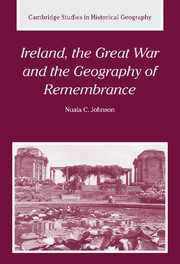Book contents
- Frontmatter
- Contents
- List of illustrations
- Acknowledgements
- 1 Geography, landscape and memory
- 2 A call to arms: recruitment poster and propaganda
- 3 Parading memory: peace day celebrations
- 4 Sculpting memory: space, memorials and rituals of remembrance
- 5 Scripting memory: literary landscapes and the war experience
- 6 Remembering the Easter Rebellion 1916
- 7 Conclusion
- Bibliography
- Index
- Cambridge Studies in Historical Geography
2 - A call to arms: recruitment poster and propaganda
Published online by Cambridge University Press: 15 July 2009
- Frontmatter
- Contents
- List of illustrations
- Acknowledgements
- 1 Geography, landscape and memory
- 2 A call to arms: recruitment poster and propaganda
- 3 Parading memory: peace day celebrations
- 4 Sculpting memory: space, memorials and rituals of remembrance
- 5 Scripting memory: literary landscapes and the war experience
- 6 Remembering the Easter Rebellion 1916
- 7 Conclusion
- Bibliography
- Index
- Cambridge Studies in Historical Geography
Summary
If, as some authors argue, the First World War marked a ‘satire of circumstance’ for the young men and women of Europe in the second decade of the twentieth century, for Irish people the events of 1914–18 marked no less a panoply of contradictions. Characterised as the first modern war where technology and communications enhanced, on scales heretofore never witnessed, the capacity to obliterate life with extreme regularity and ferociousness, the recruitment needs of all sides in the conflict implicated sections of the population which, until then, were immune from military experience and modern warfare.
Enacted, to a great extent, by a volunteer army, recruited and trained ‘for the duration’ and whose commitment to military life was to extend no longer than the conflict, the war necessitated the state to undertake a massive drive to enter into the hearts and minds of young men and women whom it sought to recruit. While to ‘fight for one's country’ or one's empire, was not in itself a new phenomenon (indeed the heroic soldier of the literary consciousness had entered the imagination of the young long before the war), the call to arms nevertheless was a structured, planned activity which, through a variety of means, sought to tap into a suite of cultural and political prejudices of the day. Despite the common references found in recruitment propaganda of all participating states, there are, equally, strategies in this literature which reveal the different recruitment policies observed by individual combatant states.
- Type
- Chapter
- Information
- Ireland, the Great War and the Geography of Remembrance , pp. 15 - 55Publisher: Cambridge University PressPrint publication year: 2003



